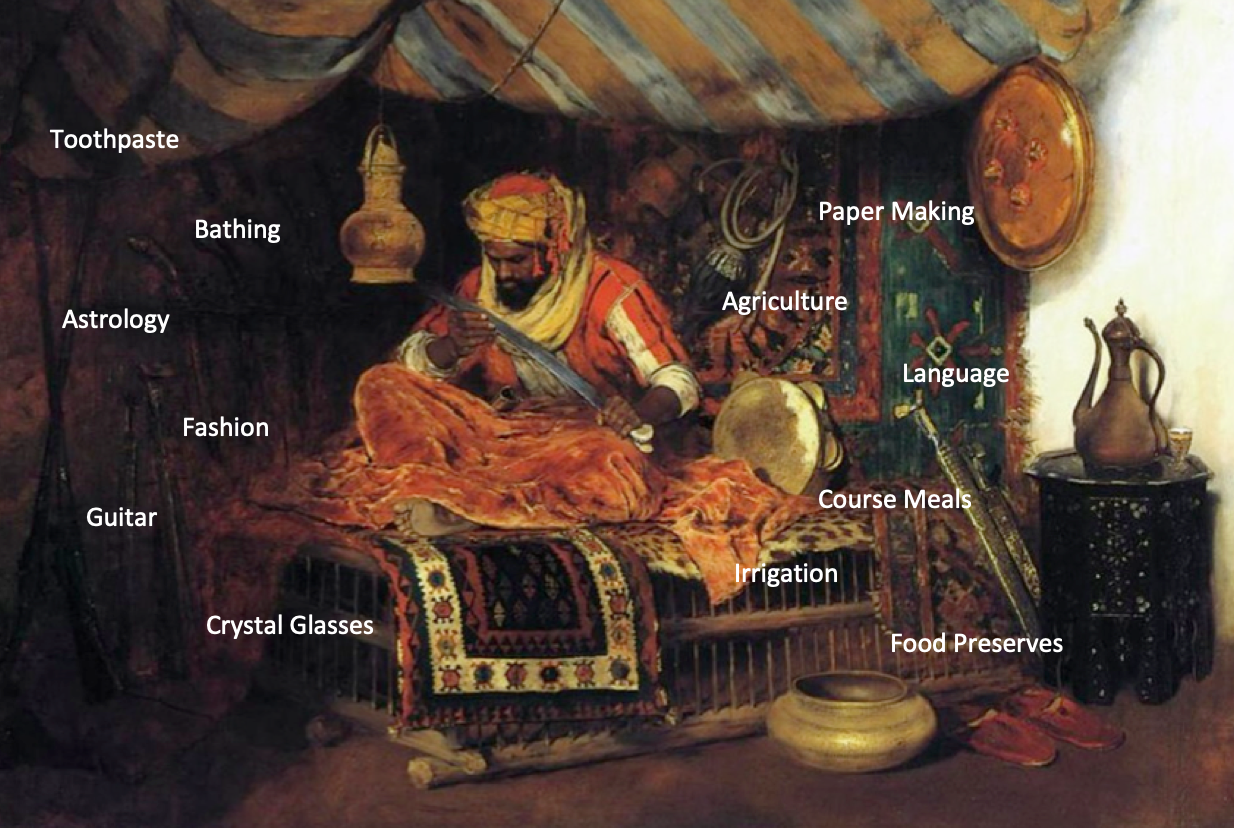We often hear about Africans teaching Europeans how to bathe and the other hygienic rituals required in order to build a healthy society. Abu l-Hasan Ali Ibn Nafi, also known as Ziryab, was born in modern day Iran circa 789 CE to a freed Ethiopian slave. His nickname, Ziryab, means blackbird and was given to him in reference to his dark complexion and stunning singing voice. He is known as the innovator of those hygienic practices such as bathing, shaving and the use of toothpaste, perfumes, fragrant oils and deodorant. Moor was a term Europeans used to describe indigenous Africans and while many people may have heard of the term, Ziryab is not a name circulated in Western history and not many people don’t understand the weight of his influence. During the 10th century these weren’t African leaders only contributions to European society.
Ziryab arrived in Cordoba, the Arabic Empire’s ‘Wild West’, in 822 CE. As a master musician, his musical talent dramatically increased his popularity in the region, introducing many of the earliest versions of several instruments, including the lute, guitar and the Lyre. He was so sought after for his musical talent that he later founded an influential music school in Cordoba, Spain translating Eastern ideas into Western European music. Though he was originally known for his musical skills, his influences weren’t restricted to the music realm. His contributions to music culture in Europe led to his becoming a respected leader that people looked to in many other areas of their lives.
Spanish occupation by the Moors began in 711 AD when an African army bed by Tariq ibn-Ziyad from northern Africa invaded the Iberian peninsula. From then the Moors ruled Spain for 800 years allowing African royals and other leaders to influence many aspects of Spanish society. Ziryab was a natural born leader and pioneer. Along with reforming music Ziryab introduced a new style of eating in Western Europe, set course meal. The new eating style began with a soup that was followed by a fish course, then a meat course and finally a desert. This is an eating style that can still be seen in Western society today. He also recommended the use of crystal, as opposed to metal, to serve drinks. Ziryab expanded Europeans diet with the introduction of a variety of new crops including hard wheat, sugar, orange, lemon, peach, apricot, fig, sugar cane, dates, ginger, pomegranate saffron and rice. All of these continue to be prominent in Spain today. Instituting these new crops in the region required the Moors intimate knowledge of irrigation and cultivation. They also taught Europeans how to properly store spices for up to 100 years.
In addition to establishing new hygiene practices, founding a music school and introducing new crops in Spain, Ziryab was also considered a fashion icon at the time. Clothes became more than just modest coverings for the body as Ziryab used clothes as a form of adornment. He was unique in the way he would change his clothes according to the seasons and weather and even went as far as having different outfits throughout the day.
During the time that London had a largely illiterate population, unpaved streets with none of the technological advancement of the Roman empire that existed 600 years prior; the Moors advanced greatly in hydraulic engineering. During the 10th century the Moors had paved roads, street lighting, running water, hundreds of public baths, mosques and well stocked libraries. Because paper was needed in order to create documents to transfer knowledge the Moors also brought paper making to Spain, and under Moorish conquest the first paper mill is recorded at Xàtiva in 1151. Along with this, over 4,000 Arabic words and derived phrases were absorbed into the Spanish language. Spanish use of words like algebra, alcohol, chemistry, nadir, alkaline, cipher checkmate, influenza, typhoon, orange, and cable can be traced back to the Moors.
As we can see in the many examples presented, the Moors mastered several methods of survival that vastly contributed to European society from the 10th century into the 12th century. During this time the Moors introduced multiple new scientific techniques to Europe in astronomy, chemistry, physics, mathematics, geography and philosophy. While conquest came as a result of war, during the Moors’ reign, the people flourished in Moorish Spain with paved roads, universal education and efficient hospitals. Leadership requires the effective transfer of knowledge and the Moors successfully transferred several methods and techniques of their high functioning society to Europeans. These contributions continue to go unnoticed and ignored in Western public education. It’s essential that we circulate these stories in order to better understand our history through a proper lens that honors the work of our ancestors.

